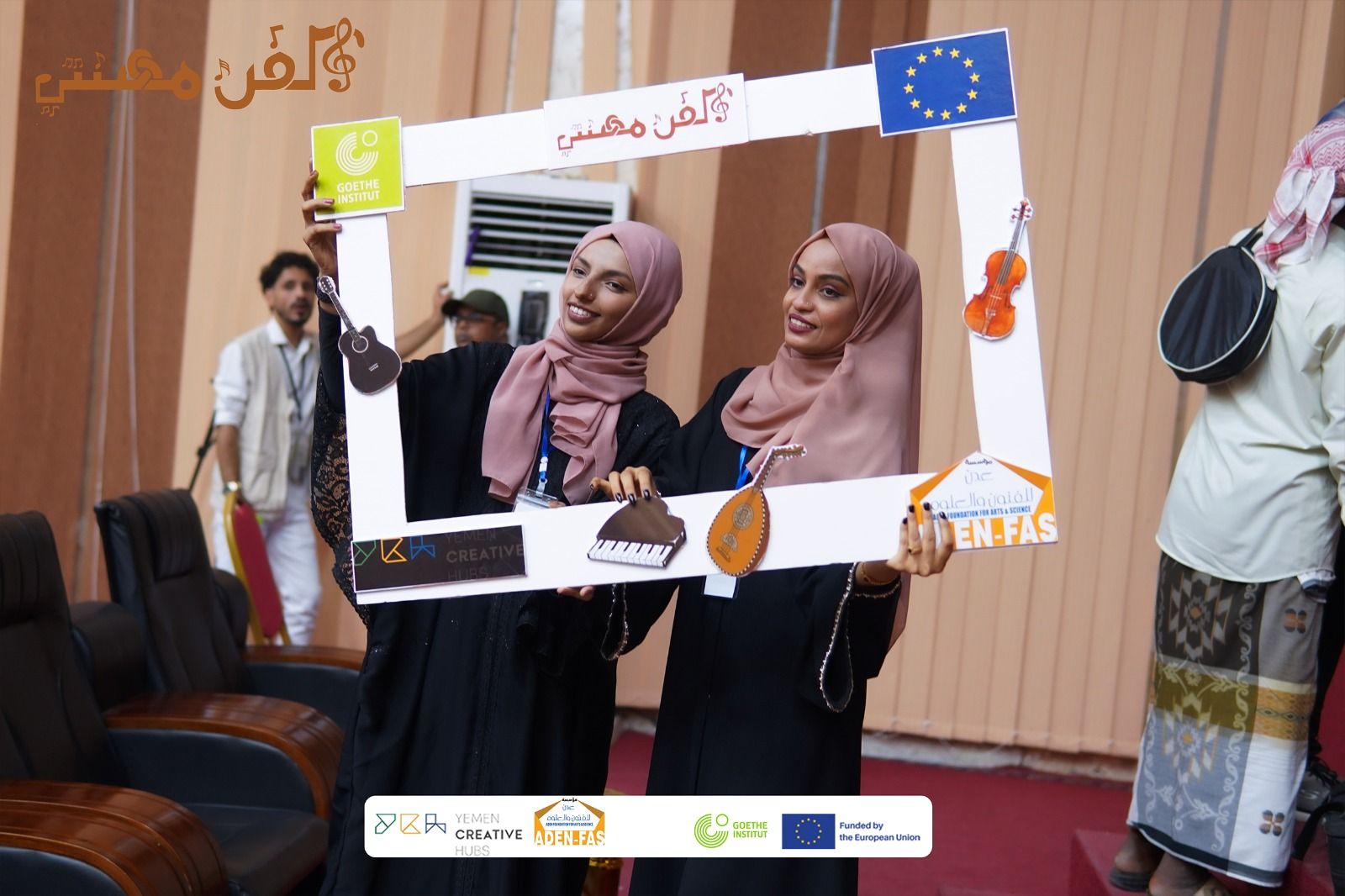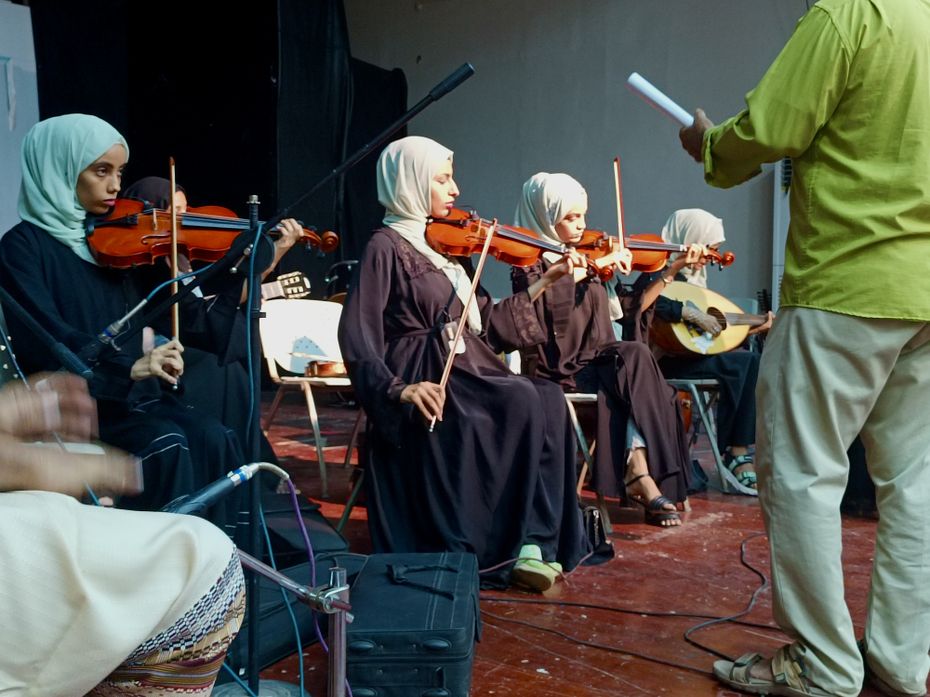In Aden, young women have pioneered Yemen's first all-female musical ensemble. Their collective passion for music, zeal, and determination challenges the societal norms in a city that has been a beacon for theatre and arts since the early last century. This endeavour underscores that music isn't solely a male domain and offers a respite from the prevailing political tensions and warfare.
Within the Aden Foundation for Arts and Sciences, 14 young women united over their shared musical passion. They aspire to have their melodies resonate globally, building on the local acclaim they've garnered from forming this unique female ensemble akin to other youth bands.
Shuaib Al-Afeef, the spearhead of the Art is My Profession initiative, remarks: "We assist these young women in navigating the challenges they face, honing their instrumental skills, and guiding them towards realizing their aspirations."
I hope this female collective
will evolve into a national
musical troupe.
The inception of an exclusively female musical group was driven by many young women's eagerness to delve into music and their conviction in embracing music as a viable profession. "We conceptualized and presented the Art is My Profession initiative to the European Union and the Goethe Institute. The project was actualized under the banner of the Aden Foundation for Arts and Sciences," Al-Afeef elaborates.
Al-Afeef observes that a significant portion of the community embraced this groundbreaking female ensemble. "I hope this female collective will evolve into a national musical troupe, participating in national official ceremonies and representing Yemen on international stages."

Training and Overcoming Challenges
The ensemble members immersed themselves in mastering four instruments: the oud, violin, piano, and guitar, during an intensive three-month course at the Aden Foundation for Science and Arts. Throughout this period, they were introduced to foundational musical concepts, instrumental techniques, and the nuances of musical culture. Esteemed musicians and trainers from the Jameel Ghanem Institute of Fine Arts in Aden facilitated this training.
One of our prominent challenges
was society's perception of us
as women in the realm of music.
While family and close friends championed the ensemble members, certain societal segments voiced their disapproval of women engaging in music, deeming it inappropriate. However, these young women confronted and countered these societal prejudices, underscoring the significance of music for women.
Dina Al-Madani, a 25-year-old violinist and ensemble member, reflects: "One of our prominent challenges was society's perception of us as women in the realm of music, traditionally seen as a male domain. This entrenched misconception was something I personally overcame with my family's unwavering support." Al-Madani, whose passion for music and the violin is palpable, describes her journey as "beautiful," marked by tenacity, collaboration, and a unified team spirit to navigate challenges and continue their musical voyage.
The project's proponents emphasize that bolstering women's presence and empowerment, both artistically and intellectually, was a primary motivation behind the ensemble's formation. This initiative seeks to reintegrate women into the musical sphere, ensuring their active participation across all domains.
Historically, Aden was a hub where women's artistic liberties thrived. However, post-1990, there was a noticeable constriction of women's cultural presence.

Abdulaziz Abbas, a renowned theatrical director and acting professor at the Institute of Fine Arts, notes that Adeni songs gained prominence after the establishment of the "Adeni Symposium" in the 1940s. This period witnessed the emergence of numerous avant-garde artists.
Abbas adds, "Adeni women made early inroads into the music scene. Najat Qasim was a trailblazer, being among the first to play the oud and sing."
The Debut Performance
The all-women musical ensemble marked its inaugural public performance on March 14th in Aden, showcasing a medley of local, Arab, and international compositions while celebrating Yemeni artistic heritage.
Cultural enthusiasts believe the ensemble has rejuvenated Aden's cultural scene, restoring its artistic prominence, a stark contrast to the war narratives that have overshadowed the city's image. Ahmed Bin Ghodl, the Director of the Culture Office in Aden, has pledged support for the ensemble, emphasizing the need to nurture such exceptional talent.
Journalist Nashwan Al-Othmani expresses his joy, viewing this as a step towards reclaiming Aden's cultural, civilizational, and artistic identity. He commends the concerted efforts across all sectors, portraying a beacon of hope.
Music has seamlessly woven
into our lives. Nothing will stop
our dreams from coming true.
Al-Othmani further comments: "The perseverance of these young women breathes life back into the city. Their dedication to their instruments, be it the violin, oud, guitar, or piano, symbolizes a dreamy artistic vision, challenging any reductive societal views."
Despite the challenges of war and societal perceptions, the ensemble's ambition remains undeterred. Dina Al-Madani, the violinist, asserts: "Music is now seamlessly woven into our lives, infusing joy and delight. Nothing will stop our dreams from coming true."
Photos: © Art is my Profession project.